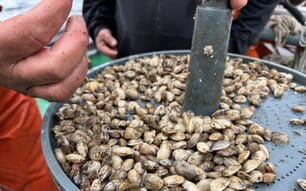For the first time in over 20 years the River Dee cockle fishery has been open three years running, and this year its fishermen are getting an early harvest thanks to bumper numbers of cockles in the beds.
The cockle season usually lasts from July to December, but this year the cockles are so abundant that the Environment Agency is allowing fishermen six days this month to take an early crop. It is hoped that harvesting some cockles in overcrowded areas will allow those left behind more room to grow and mature, ready for the official start of the season in July. It also reduces the risk of overcrowded cockles dying in a heat wave.
For the 50 licensed fishermen that fish the Dee, it’s a welcome financial boost - with small cockles fetching around £200 a tonne.
The recovery of the cockle beds in the once industrially-polluted Dee estuary began in the early 80s when heavy industry began to move away from the area. Fishermen that previously had to go miles off the Flintshire coast began to fish once again in the estuary, and cockles started to return to the beds.
Tighter environmental controls by the Environment Agency on remaining industry around the estuary, a clean up of contamination left by the former steel works, as well as investment into improved sewage treatment, led to a dramatic improvement in water quality.
By the mid 2000s the cockles were returning in large numbers, and with them hundreds of cockle pickers. The cockle beds were regularly picked bare, as there were no limits set on how many cocklers were allowed on the beds, or how much they were allowed to take. This led to a boom and bust cycle on the Dee, where a record crop one year would mean the fishery would have to be closed for the following two years in order for the beds to recover.
The decision taken by the Environment Agency in 2008 to limit the number of licensed cocklers on the Dee, aims to make cockling a long- term, sustainable industry on the estuary and ensure a regular income for the licensed fishermen.
Since then, more than 2,250 tonnes have been harvested with an estimated market value of £1.16m. The licensing scheme means that the cockle beds should be able to open every year, creating work not only for the cocklers, but also for processors and sellers.
David Edwell at Environment Agency Wales, said: “The fact we are gearing up for another open season for the fishery this year is good news and early signs are that next year will be even better.
“This is all part of managing this fishery properly so the cocklers get a good, regular income from the beds. What we learn from the way we manage the cockle beds on the Dee also helps inform our management of other cockle fisheries across the UK.”
Cockles Thrive In Wales
WALES, UK - A commercial cockle fishery in Wales is thriving once again thanks to a combination of cleaner water and sensible limiting of cockle picking.



